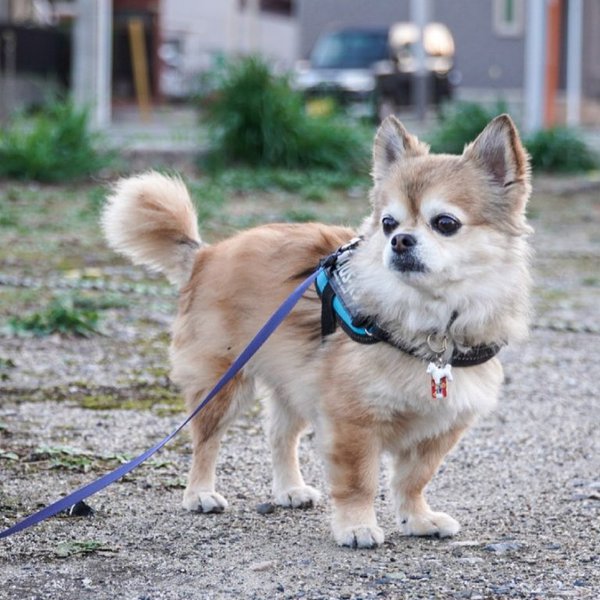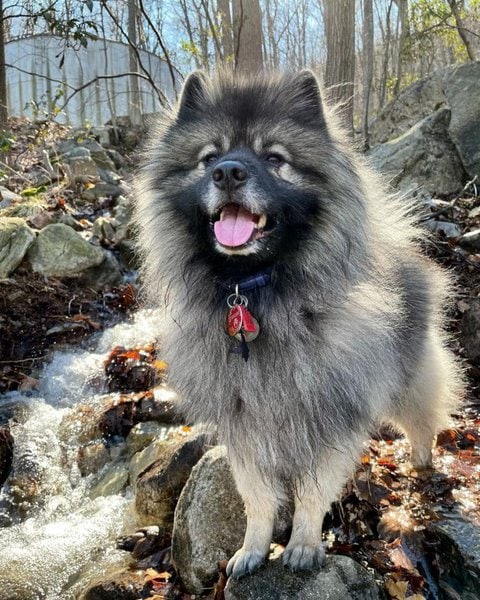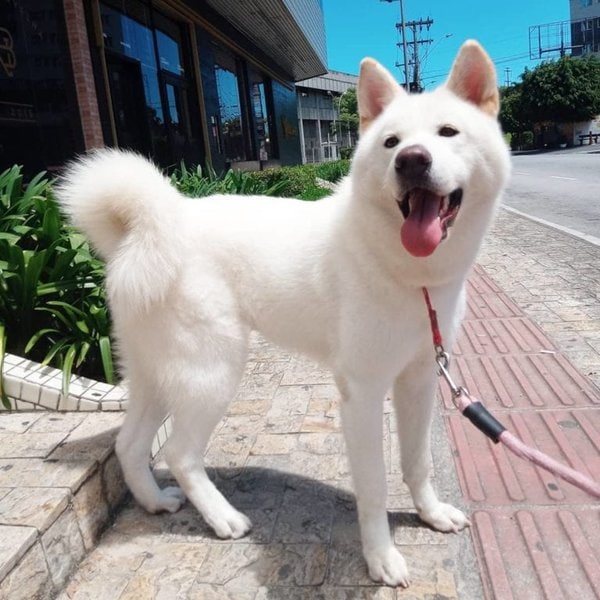All dogs bark but some do more than others. It’s just their way of communicating with us, although there are pups that have a tendency to be a bit more yappy for a reason. Ever wondered which dog breeds bark the most?
Boston Terriers are well-mannered canines but surprisingly, barking frequently is second-nature to them. The same goes for Yorkshire Terriers and Pomeranians, who are notorious for being amazingly cute, cuddly and yappy!
So if you’re curious about these dog breeds that bark the most, stick around and discover more about these super vocal fellows and what’s the deal with all that barking!
26. Boston Terrier

The Boston Terrier is considered America’s Gentleman. This is a fallacy. After all, the Boston Terrier is one of the most well-known barkers out there.
These dogs love being verbal, and they’ll attempt to communicate with pretty much anyone and anything. Beg them to be quiet. They’ll probably listen for a short period.
25. Yorkshire Terrier

These tiny pups have a big attitude. They are territorial, energetic, and highly protective, which explains the constant barking. But all they really want to do is to protect you from intruders, and their favorite way to do so is by yapping.
Fortunately, you can reduce your sweet little Yorkie’s desire to bark. Training can definitely help, as well as introducing them properly to friends who are not a part of your household. This will help reassure your pooch instead of thinking everyone’s a threat.
24. German Shepherd

German Shepherds are highly protective pups that make them excellent guard dogs. And with such great responsibility comes some yapping power! They take their jobs seriously as guard dogs and bark whenever they detect a threat is nearby.
Socialization can help curb these barking tendencies a bit. These pups need to be reassured, as well, if the reason for barking is anxiety or any other emotional factors.
23. Chihuahua

There are many reasons why Chihuahuas bark. But the two primary triggers for their constant barking are separation anxiety and potential threats. These pups are territorial fellows, and they aren’t easily comfortable when someone appears to enter their private space.
Chis are also protective pups. They get uneasy each time someone gets too close to their favorite humans, and whoever that “intruder” is can expect to hear a woof or so from this super loyal pooch.
22. Basset Hound

The Basset Hound is a tracker and most commonly used by hunters. They’re not going to bark randomly. Instead, they’ll bark when they suspect someone or something is nearby.
The high pitched barks of the Basset Hound may very well send a shriek down your spine. Don’t be surprised if your basset hound’s bark stirs you from your sleep.
21. Rottweiler

Rottweilers aren’t really your yappy canine. These muscular, powerful dogs aren’t simply inclined to bark as they are more of an observer than a reactor.
But in some cases, they do let out a woof, a growl, or anything to get people’s attention. Common reasons behind their frequent barking include the need to protect, attention-seeking, loneliness, or just plain boredom.
20. Siberian Husky

It’s not very common to hear Siberian Huskies bark. In fact, they mostly howl or “talk”, producing those cute little vocalizations when they want to play.
As these canines aren’t territorial at all, they are relatively quiet pooches. But when they get lonely or bored, your Husky can be a bit more talkative than usual. So, be sure to keep your pet entertained to beat the blues and howls away.
19. Jack Russell Terrier

The Jack Russell Terrier is a very energetic dog. You’re going to love his or her charming attitude. Just remember to grab your earplugs. The Jack Russell Terrier loves barking, and they’ll do just that pretty much every opportunity they get.
18. Keeshond

The Keeshond is a beautiful breed of dog. They love companionship and being around others. They also feel the need to protect their family. This is generally their main reason for barking. They like to let others know when something is coming their way.
Add a Keeshond to your backyard, and you can pretty much guarantee that you’re going to hear consistent barking.
Thankfully, the Keeshond is a very intelligent breed. Therefore, they can be trained a little easier than some of the others.
17. Alaskan Malamute

Just like their leaner cousins, the Siberian Husky, Alaskan Malamutes don’t quite bark but they talk. They produce these rumbly, low noises that people often mistake as growling. But it’s not always a sign of aggression and could be an innocent invitation to play!
They do bark sometimes but only when they feel afraid or threatened. Otherwise, Mals are laid-back pups and won’t give you much issue at all with the neighbors.
16. West Highland White Terrier

Westies are expressive and they don’t hold back on what they’re feeling. Every new sound or sight they experience makes them want to bark (and they do) but not constantly.
When these pups bark too often, it has nothing to do with their general temperament. Instead, it could be a behavioral issue, which is something that proper training and socialization can address.
15. Newfoundland

These massive fluffballs are famous for their deep and thundering bark. But thankfully, they aren’t really fond of barking too much. At least most of them aren’t.
There are Newfies, however, that bark more than others, and that’s something the owner can resolve with training. With these pups’ smarts and loyalty to their families, training them to bark less should be a pretty straightforward experience.
14. Bernese Mountain Dog

Berners are historically bred as watch dogs, so you can expect them to bark quite a lot… And loudly! They also love to chase tiny animals, which is accompanied by some vocal power.
If you want to tone down your pup’s tendency to bark more often than they should, you can do so with early training. It’s also good to socialize them well as this can make them more reassured instead of thinking everyone outside of the household is an intruder.
13. Saint Bernard

Saint Bernards are some of the most laid-back and relaxed pups out there. They love people of all ages, especially children. With this easy-going personality, there really is not any room for a ton of barking.
Although Saint Bernards are not very vocal, they are definitely quite expressive. These loving canines don’t hesitate to show their affection to their owners. Sometimes they forget how huge they are and simply feel at home on your lap!
12. Scottish Terrier

Scotties are very vocal creatures. They bark a lot at strangers or each time they see any animal passing by their territory. So if there are noise rules in your area, these pups are not the most ideal ones to have.
But if you like an active companion that never says no to an adventure, that’s what a Scottie is for. They have high energy and will keep you entertained for hours on end.
11. Maltese

They’re small and cute. They’re cuddly and adorable. Just remember not to be thrown off by their appearance. The Maltese is a feisty little dog, and it is going to bark at pretty much anything and everything. They might not be vicious, but their bark may sound like it.
It is very common for these dogs to bark at everything they encounter. They’ll yelp at the mailman, friends, neighbors, and whoever else visits your home. Extra training will be needed to keep this dog quiet in your backyard.
10. Australian Shepherd

Aussie Shepherds are bouncy, energetic, and spirited pups. They do bark more than the average pooch, thanks to their herding background. Even when they’re not hard at work, they still let out a couple of woofs when they’re afraid, startled, or uneasy.
One thing about Aussies is that they are always eager to please their owners. This makes training relatively easy, which can help minimize the yapping tendencies a bit.
9. Miniature Schnauzer

Bred as watch dogs, Miniature Schnauzers are yappers. They love to protect their families and ward off intruders with their constant barking. This natural tendency can also be their way of asserting their dominance or expressing boredom.
Not too keen on having a yappy Schnauzer? Try to introduce some tactics to curb the unnecessary barking. This is a smart and obedient breed, so you can expect it to listen and do as you please.
8. Akita

Akitas are a cross between a dog and a cat… At least when it comes to thor personality. They are fastidious as felines and don’t quite make a lot of noises when hunting.
However, Akitas bark when there’s a perfectly good reason. Perhaps it’s an expression of hunger, loneliness, anxiety, or when a real threat is coming. So when these pups bark, they’re sending a strong message and not just unnecessary noise.
7. Lhasa Apso

Your Lhasa Apso believes its purpose in guarding your backyard against intruders. It has a history of being good guard dogs and your fluffy friend may very well feel the need to take his or her duties to the extreme.
You will need extra time and energy to train Lhasa Apso to stop barking at everything.
6. Cavalier King Charles Spaniel

Famous for their sweet and affectionate character, the Cavalier King Charles Spaniel is not much of a yapper. They would very much rather cuddle with you than bark all the time.
But as with any animal, no two Cavaliers are alike. Some may be quiet and laid back while others are a bit more fussy and yappy. Barking frequently is a behavioral concern that you can address with early socialization and correct training.
5. American English Coonhound

American English Coonhounds are impeccable hunters. They’re fast, energetic, and a bit too loud when out in the field. These pups are yappers and not quite a good choice for apartments.
Firm training is a must to address constant barking. It also helps to socialize them, so they can feel more at ease with all types of people instead of perceiving them all as threats.
4. French Bulldog

Frenchies bark but not more than it needs to. They are vocal about their feelings whether it’s fear or anxiety. Or they can also bark when they are hungry and not feeling too good.
But overall, these canines are quieter than other dog breeds. Proper training can also keep their yapping to a minimum, so it should not be an issue keeping them in a small apartment.
3. Pomeranian

Once a Pom feels threatened by strangers, there’s no stopping their yapping. Well, unless you beg them to! They bark when they hear the doorbell, or an approaching footstep, or any noise, literally that’s within their radar.
These tiny fluffers have so much energy that they simply bark. So, if you’re looking to bring home a Pom, be sure to start training early on and socialize your pooch well to minimize the yapping.
2. Cairn Terrier

These sassy little pups were bred to chase after their prey. Cairns are determined hunters, which is also one of the reasons behind the constant barking.
When they can’t wiggle themselves out of a burrow after a long chase, they bark. And they don’t hesitate to let out a bunch of woofs when they’re lonely, bored, afraid, and anxious. No worries, though – these are habits that you can tone down with early training and socialization.
1. Beagle

First up, you have the beagle. Sure, the dog will have an upbeat personality and tons of energy. Unfortunately, they’re yappers.
When Beagles are bored, their excess energy will translate into more barking. Keep your beagles busy or their bark will sound like a siren alerting everyone in your community.
Related Questions
Can You Stop A Dog Barking? Yes, you can definitely stop your dog from barking too much. Whenever your pooch barks, command them to be quiet in a firm, yet calm voice. Once your pup stops barking even for just a second, praise him and give him a treat. This will help your pet understand the connection between non-barking and getting a reward in the end.
Do Small Dogs Bark More? Compared with bigger dogs, small dogs are more fearful and anxious, which causes them to bark more. They can get spooked easily by loud noises and can be quite nervous when around strangers. Hence, they tend to growl and bark frequently to express their feelings.
Do Dogs Learn To Bark From Other Dogs? Yes, they do. Young pups mimic older canines each time the latter bark at noises they hear or when strangers go near your home. But as they grow older, their barking could be their way of alerting you of a threat or simply to communicate their feelings with you.





